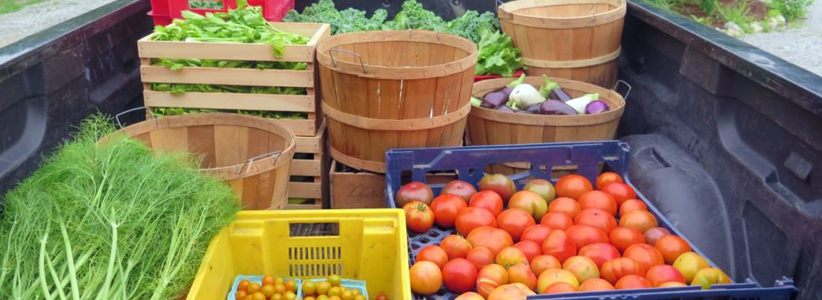Rosie’s Place and Gaining Ground Team Up to Take on Hunger

As guests peruse items at the Rosie’s Place food pantry in downtown Boston, the odds are good that the fruits, vegetables and herbs they’re choosing from were grown in Concord.
Gaining Ground, a nonprofit organic farm on Virginia Road, is in its third year of providing fresh produce to Boston’s longest-running women’s shelter.
“It’s a marvelous partnership,” Michele Chausse, Rosie’s Place director of communications, said of the relationship between Rosie’s Place and Gaining Ground.
According to Amy Capofreddi, executive director of Gaining Ground, it was employees from Rosie’s Place that provided Gaining Ground assistance first in the partnership, sending over a team to pick crops in 2014.
Capofreddi said their farm sees more than 2,500 volunteers annually, but the group from Rosie’s Place left an impression on their staff. A year later, Gaining Ground began providing food for the pantry.
Rosie’s Place offers hot meals three times a day and also offers a food pantry where guests can take home 20 to 30 pounds of food every month. That assistance can be vital for the women who rely on the shelter, who Chausse said are often forced to choose between paying for food or other necessities like medical care or rent.
Chausse said that the partnership with Gaining Ground was special because it furthered the primary goal at Rosie’s Place: treating their guests with respect.
“The thing that’s so remarkable about Gaining Ground is that they pick it that morning and we get it that afternoon,” Chausse said. “Being able to offer (our guests) fresh produce shows them respect.”
Capofreddi said Gaining Ground can’t offer same-day delivery to every group they partner with, but two volunteers, Alan and Susan Silberberg, have adopted the Rosie’s Place deliveries as a personal project. Alan drives the food from Concord into Boston himself to ensure it gets to Rosie’s Place the day it’s picked.
Gaining Ground provides more than 25 types of fruits, herbs and vegetables to Rosie’s, and guests are allowed to choose what they would like from that week’s options. The option to take food they actually want and will use, rather than being given a prescribed list of food they have to take, further empowers the women using the food pantry, according Chausse.
“Why shouldn’t they have the best?” Chausse asked.
About 10 percent of the food harvested at Gaining Ground goes to Rosie’s Place, according to Capofreddi. The rest of the food is donated to other hunger relief organizations in the area.
In total, Gaining Ground donates 3,000 pounds of produce every week.
“Healthy food is so integral to every part of a person’s life,” Capofreddi said. “Access to healthy foods is a right, not a privilege.”
Capofreddi said that the model of volunteer-based farming at Gaining Ground has been successful in part because of the hands-on nature of the service. Actually getting their hands dirty and seeing the volume of food that gets donated from the farm, Capofreddi said, can give volunteers a unique perspective on the scale of the country’s hunger problem.
“When you see 25 boxes of produce that you helped pick,” Capofreddi said. “It’s really humbling.”